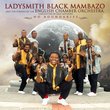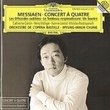| All Artists: Radu Lupu Title: The Complete Decca Solo Recording Members Wishing: 1 Total Copies: 0 Label: Decca Records Original Release Date: 1/1/2010 Re-Release Date: 5/11/2010 Album Type: Box set Genre: Classical Style: Opera & Classical Vocal Number of Discs: 10 SwapaCD Credits: 10 UPC: 028947823407 |
Search - Radu Lupu :: The Complete Decca Solo Recording
 | Radu Lupu The Complete Decca Solo Recording Genre: Classical
All-new collection brings together all of Lupu's published solo recordings--for the first time! 2010 marks the 40th anniversary of Grammy® award winning pianist Radu Lupu's association with Decca, and in November he c... more » |
Larger Image |
CD DetailsSynopsis
Album Description All-new collection brings together all of Lupu's published solo recordings--for the first time! 2010 marks the 40th anniversary of Grammy® award winning pianist Radu Lupu's association with Decca, and in November he celebrates his 65th birthday. This collection features recordings for which Lupu has achieved worldwide acclaim and includes pieces by composers such as Schubert, Beethoven, Brahms, and Schumann. A special bonus is the inclusion of Radu Lupu's first concerto recording--Beethoven's Third Piano Concerto-- made in 1970 with the London Symphony under the direction of Lawrence Foster. Radu Lupu continues to give recitals and perform concertos in venues throughout the world and many of his recordings have achieved extraordinary reviews. 10 CDs at a budget price, packaged in an elegant capbox. Similarly Requested CDs
|
CD ReviewsRadu Lupu's Mood Indigo Roochak | 05/29/2010 (5 out of 5 stars) "Purchasers of Decca's 2005 Radu Lupu Edition -- three budget-priced collections devoted to Schubert, Beethoven, and Brahms -- may be hesitant to buy the new "complete Decca solo recordings" box set. The earlier sets are worth hanging onto for Lupu's complete Beethoven piano concertos with Mehta and the Israel PO; the Brahms D minor concerto with Edo de Waart and the London Philharmonic; and Lupu's 1986 recording of the Beethoven Quintet for piano and winds. What's new to the 10-disc Decca box are Beethoven's opus 49 piano sonatas (recorded 1977), both sets of Schubert's Impromptus (1982), and, weirdly, Lupu's 1970 debut recording of Beethoven's C minor piano concerto with Lawrence Foster and the LSO. This set also rescues Lupu's 1993 Schumann disc from oblivion, which was long overdue. CD1 - Beethoven I 78.23 Two Rondos, op.51 32 Variations on an original theme in C minor, WoO 80 Piano Concerto no.3 in C minor, op.37 Piano Sonata no.19 in G minor, op.49/1 Piano Sonata no.20 in G major, op.49/2 CD2 - Beethoven II 65.49 Piano Sonata no.14 in C# minor, op.27/2 "Moonlight" Piano Sonata no.8 in C minor, op.13 "Pathetique" Piano Sonata no.21 in C major, op.53 "Waldstein" CD3 - Brahms I 52.20 Piano Sonata no.3 in F minor, op.5 Theme and Variations in D minor (arr. from String Sextet in B flat, op.18) CD4 - Brahms II 70.19 Two Rhapsodies, op.79 Three Intermezzos, op.117 Six Piano Pieces, op.118 Four Piano Pieces, op.119 CD5 - Schubert I 74.03 Piano Sonata no.16 in A minor, D.845 Piano Sonata no.18 in G major, D.894 CD6 - Schubert II 80.38 Piano Sonata no.5 in A flat, D.557 Two Scherzos, D.593 Six Moments musicaux, D.780 Piano Sonata no.19 in C minor, D.958 CD7 - Schubert III 72.12 Piano Sonata no.20 in A major, D.959 Piano Sonata no.14 in A minor, D.784 Piano Sonata no.1 in E major, D.157 CD8 - Schubert IV 58.57 Piano Sonata no.13 in A major, D.664 Piano Sonata no.21 in B flat, D.960 CD9 - Schubert V 66.06 Four Impromptus, D.899 Four Impromptus, D.935 CD10 - Schumann 74.36 Humoreske, op.20 Kinderszenen, op.15 Kreisleriana, op.16" Who is it for? Asia Khuf | White Salmon, WA USA | 07/03/2010 (4 out of 5 stars) "Collections like this one puzzle me. If you're a Lupu fan, as I am, you probably have at least a few of these discs already. I own half of this set--the incredible Impromptus and Moments, the wonderful Schumann, the excellent Brahms, and some of the less impressive Beethoven. So the question becomes whether to buy this set just to get Lupu's Schubert sonatas in one package. I guess if you like Lupu and don't have much by him, it might make sense to get this set. But it might make more sense to buy individual CDs of Lupu's very best--you can't go wrong with his Impromptus, though Schnabel's is also great--and shop around for better versions of other works by, say, Kempff, Rubinstein, Richter, or Andsnes." A Welcome Birthday Tribute for a Great Artist Johannes Climacus | Beverly, Massachusetts | 08/12/2010 (5 out of 5 stars) "Decca has taken the opportunity of Radu Lupu's sixty-fifth birthday to repackage his complete solo recordings for that label in a convenient and economical bargain box. Veteran pianophiles will have long since experienced and acknowledged this great artist's remarkable gifts, and may well own one or more of the recordings anthologized herein. However, for collectors unfamiliar with Lupu's achievements and his regrettably few outings in the recording studio, this superb retrospective is tailor-made.
Suffice it to say that Lupu is both a formidable virtuoso and a consummate musician. His technique is second to none, the refulgent sonorities he coaxes from his instrument quasi-orchestral in their kaleidoscopic array, his grasp of structure and style comprehensive, and his sensitivity to lyrical nuances instinctive. These qualities are particularly well suited to the solo repertoire he has chosen to record: Beethoven, Brahms, Schumann, Mozart (not for Decca, however)--and pre-eminently Schubert. I doubt if there is, or ever has been, a greater interpreter of this composer than Lupu. Not even Richter manages to sound Schubert's depths as thoroughly and effortlessly at Lupu. This anthology is therefore worth purchasing for its generous helping of Schubert Sonatas and shorter works. Among the highlights of this selection are exhaustively, even exhaustingly, cogent traversals of the Impromptus (no hint of the salon or of over-familiarity here); a devastating account of the haunting A-Minor sonata D. 845--all the more shattering for its surface understatement; a richly-textured version of the well-known A-Major Sonata, D. 664 that rivals, and in my estimation surpasses, Richter's famous recording for lyrical splendor and depth of insight; and a performance of Schubert's final Sonata, D. 960 that can only be called sublime--an unforgettable interpretation that gets everything right. But then, Lupu tends to get nearly everything right whenever he performs Schubert: tempo, dynamic contrasts, mood, touch, texture and of course the all-important harmonic and tonal displacements. He understands with astonishing acuity the depth of Schubert's existential angst, even even at the most seemingly carefree moments--though he never wears Schubertian trauma on his sleeve (as some other renowned Schubertians, such as Richter, Arrau and Uchida, occasionally do). If I have spent a disproportionately large portion of this review on Lupu's Schubert, that is because this pianist is one of the the few who fully appreciates, and consistently realizes, the extent of the composer's achievement in piano literature. And it may well be that Lupu understands Schubert more acutely than any interpreter since Schnabel first alerted us to the full stature of these inexhaustible works. I must not, however, slight Lupu's achievement in Brahms and Schumann. He brings his poetic sensibilities and keen intellect to bear on both, with predictably satisfying results. Lupu's gifts are abundantly evident in late Brahms; these elusive works in lesser hands can seem both enigmatic and insubstantial, but Lupu makes the listener aware of their sensuous beauty without slighting their inwardness. Likewise in Schumann's evergreen miniatures from op. 15 Lupu enables us to "see eternity in a grain of sand," while in the more ambitious Humoreske, op. 20 and Kreisleriana, he effectively integrates what might seem like a patchwork of short sections into an organic whole. Moreover, Lupu's sumptuous tone and hypersensitive touch are perfectly suited to Schumann's sound-world as to Schubert's. I leave Beethoven for last only because I find Lupu's forays into this composer (comparatively) less satisfying than his astonishingly perceptive Schubert, Brahms and Schumann. Lupu's take on Beethoven is predictably but excessively rhapsodic. The Third Concerto (the pianist's first recording for Decca, and the only concertante work included in this anthology) is a case in point: in this work phrasing, rubato and dynamics are waywardly, if at times intriguingly, personal. The same goes, to a greater or lesser extent, for the three famous "named" sonatas: Lupu's approach, though rapturously beautiful to the senses and highly nuanced, lacks the incisiveness, even abruptness, we expect in Beethoven. One is reminded of both the vitues and vices of Arrau's Beethoven (Lupu's interpretation of the "Waldstein," for instance, strongly recalls Arrau's, though with more plausible tempi). But I mustn't dwell on these shortcomings, for there is also much to enjoy in the two discs devoted to Beethoven--including a particularly compelling account of the Thirty-Two Variations on an Original Theme in C minor, and a delightfully genial traversal of the underappreicated Rondos op. 51 (even if Lupu's lyrical approach tends to turn these works into the Impromptus Schubert never wrote). Throughout this set the engineers have provided oustandingly realistic piano sonorities--Lupu's prismatic play of color and tonal shadings is conveyed so vividly as to be nearly palpable. Likewise, his characteristically wide dyanamic range--from the barest whisper to majestic, and at times appropriately cruchy, fortissimos--is faithfully caught. Given the diverse range of occasions, venues, technicians and producers involved--from the analog era to recent digital--the sound is of consistently high quality. Occasionally (in the more recent recordings) I noticed a slight overabundance of "hall" resonance, though not so much as to blur detail. Documentation is good; notes are brief but sufficient. In sum, then, this is a uniquely valuable collection, representing the considerable achievement of a pianist who must be accounted one of the very greatest of his generation. Strongly recommended to pianophiles generally, but most of all to earnest Schubertians." |

 Track Listings (10) - Disc #1
Track Listings (10) - Disc #1



